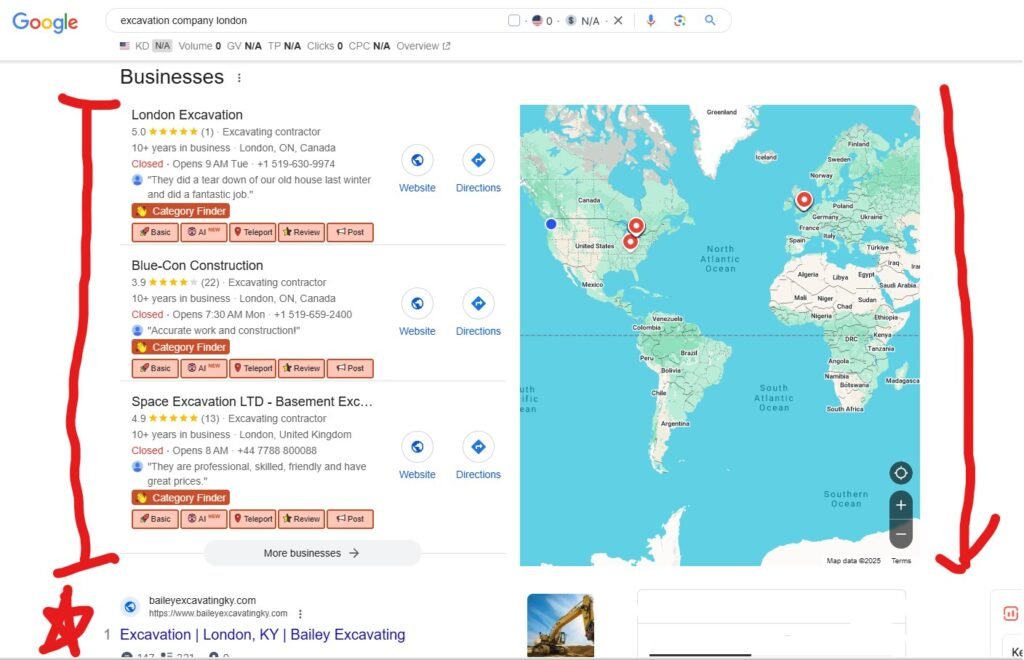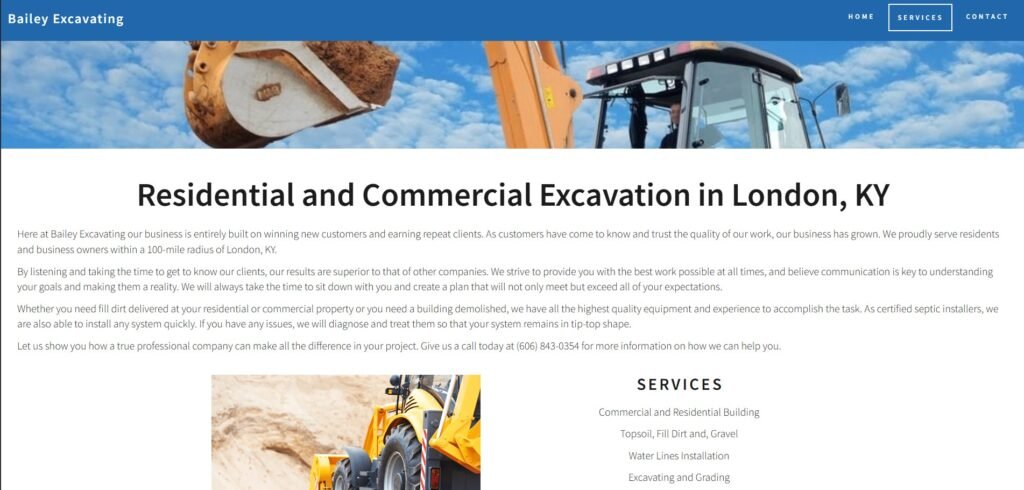Local service businesses have long relied on Google Maps to connect with customers searching for nearby services. However, the EU’s Digital Markets Act (DMA) has forced a major shift in this reliance. Designed to prevent monopolistic practices by tech giants like Google, Apple, and Meta, the DMA prohibits self-preferencing and requires equal treatment of competitors’ services. For Google, this means removing features like Maps previews and tabs from search results, fundamentally changing how customers find local businesses.
This shift is more than a small inconvenience. Customers now face additional steps to locate services, often turning to alternative platforms. As a result, competition for organic rankings has intensified, leaving businesses that relied on Google Maps and the Local Pack struggling to maintain visibility.
But this doesn’t have to be a setback. Businesses willing to adapt can leverage this change as an opportunity. By creating optimized local service pages, listing on alternative platforms, and improving organic SEO, businesses can not only recover lost visibility but also thrive in this evolving landscape. This blog outlines actionable strategies to help your business stay competitive amidst these changes.
What is the Digital Markets Act (DMA) and Why Does It Matter?
The Digital Markets Act (DMA) is a landmark piece of EU legislation aimed at curbing monopolistic practices by major tech companies referred to as “gatekeepers,” including Google, Apple, Meta, Amazon, and Microsoft. The DMA prohibits self-preferencing, requiring these companies to treat their own services equally to competitors. For Google, this means no longer giving preferential treatment to services like Google Maps in search results.
As part of its compliance, Google has removed the Maps widget from appearing in the top of search results, making it unclickable. Users must now open Google Maps manually or input the address directly, adding extra steps to the process. Additionally, the Maps tab has been removed from the primary navigation bar in Google Search, forcing users to rely on alternative mapping platforms. While this compliance levels the playing field for competing services, it significantly reduces visibility for businesses that relied heavily on Google Maps and the Local Pack.
Google has also introduced aggregator units in search engine results pages (SERPs), particularly for travel and shopping-related queries. These units prioritize major comparison platforms or booking sites over individual businesses, further challenging smaller companies’ ability to rank prominently. Carousel-style rich results, another feature introduced under DMA compliance, often display links to aggregator sites rather than directly to businesses.
For businesses, these changes mean less visibility in traditional search results, requiring a shift in strategy to maintain discoverability. The implications for local service businesses are significant, as this reliance on Google Maps visibility must now be replaced with alternative methods like optimized local service pages and diversification across platforms.
The Unique Challenges for Local Service Businesses

The Digital Markets Act (DMA) has fundamentally changed how customers find local businesses online. The removal of Maps previews and reduced prominence of the Local Pack have made it harder for businesses to stand out in search results.
As user behavior shifts and reputation management becomes more complex, local service businesses must adapt by focusing on organic SEO, real-time updates, and diversifying their visibility strategies.
Reduced Visibility in Local Search
Service industries like plumbing, electrical work, restaurants, and travel-related businesses that depend heavily on location-based searches have been among the hardest hit by these changes. The removal of Maps previews from search results and the reduced importance of the Local Pack have significantly limited opportunities for smaller businesses to stand out.
Businesses also must now focus on keeping their information accurate and up to date. Platforms like Google prioritize real-time updates for features such as hours, closures, and special services.
Knowledge Panel adjustments in Europe mean that clicking on a business’s reviews now redirects users to aggregated review pages, rather than directly showing Google Reviews. This makes reputation management across multiple platforms even more critical for maintaining customer trust and visibility.
Shift in Customer Behavior
With Maps previews removed, customers must now take additional steps to locate nearby businesses. Many are increasingly relying on alternative platforms, as well as third-party directories, to navigate the search process. This shift has created both challenges and opportunities, as businesses must now expand their presence beyond Google to remain visible.
These changes have also frustrated many users, who find the additional navigation steps cumbersome and less intuitive. Despite these shifts, Google Maps itself remains a key tool, as users who directly access the platform bypass the limitations seen in traditional search results. For businesses, optimizing their profiles on Google Maps is still critical for capturing direct traffic.
Increased Competition
The removal of Maps previews has also intensified competition, as businesses now rely more heavily on organic rankings. Google has introduced aggregator units in search results, which prioritize large comparison platforms like booking or review sites, further overshadowing smaller businesses. For local service providers, this creates significant challenges in competing for visibility.
Google has also rolled out carousel-style rich results for certain queries, such as travel or shopping-related searches. These features often link to major platforms rather than individual businesses, adding another hurdle for smaller companies. Transparency labels, now required on paid ads within SERPs, clearly disclose the ad source, increasing visibility for larger platforms and making competition tougher for smaller advertisers.
Why Local Service Pages Are Now More Important Than Ever

With the diminished prominence of Google Maps and the Local Pack, businesses must shift their focus to creating optimized local service pages. These pages serve as a vital tool to regain visibility by ranking for location-specific searches. Google’s preference for store locator pages, which provide real-time updates and accurate business information, makes them a key strategy for local SEO.
Filling the Visibility Gap
As Google Maps becomes less accessible in search results, businesses need alternative ways to connect with their audience. Well-optimized local service pages can help businesses replace lost visibility by ranking organically for keywords like:
“24/7 Plumbing services in Berlin”
Or
“Emergency electrical repair in Paris”
Store locator pages, those which include detailed and accurate information, are now favored by Google for providing users with reliable data, making them essential for businesses looking to maintain their local presence. These pages also reduce dependency on outdated directories that often fail to meet user expectations.
What Makes a Great Local Service Page?
To stand out in the new search landscape, a great local service page should include:
- Keyword Optimization: Incorporating location-based keywords like “emergency plumbing in Berlin” in headings, meta titles, and content.
- Detailed Service Information: Offering comprehensive descriptions tailored to the specific needs of each area served.
- Local Relevance: Mentioning landmarks, neighborhoods, or events to create a stronger connection with the local audience.
- Visual Content: Showcasing photos and videos of completed work in specific locations to establish trust and engagement.
- Customer Testimonials: Highlighting reviews from local customers to enhance credibility.
Benefits of Optimized Service Pages
By investing in optimized local service pages, businesses can:
- Improve Rankings: Capture organic traffic for highly competitive, location-based searches.
- Increase Customer Trust: Build a connection with potential clients through localized content and testimonials.
- Compete Effectively: Outperform businesses that rely solely on third-party platforms like Yelp or TripAdvisor by offering direct access to services.
Local service pages gives businesses to take control of their visibility, providing a sustainable alternative to Google Maps and helping maintain a competitive edge in the ever-changing SEO landscape.
Actionable Steps for Local Service Businesses

With local SEO undergoing significant shifts, businesses must adopt new strategies to stay visible and competitive. From creating tailored local service pages to leveraging alternative platforms, these actionable steps will help service businesses adapt to the challenges introduced by the DMA.
Create or Update Local Service Pages
Building or improving individual pages for each service area is important for ranking in location-specific searches. These pages should include structured data markup to highlight essential details like services offered, geographic areas covered, and business hours.
Google prioritizes pages that offer accurate, real-time information, so maintaining updates on special hours, closures, or events is crucial.
Optimize Your Website for Mobile Users
With the majority of local searches occurring on mobile devices, guarantee your website is mobile-friendly is non-negotiable. Features like fast load times, responsive design, and click-to-call buttons improve user experience and increase the likelihood of conversions.
Leverage Alternative Platforms
Expanding your business’s presence beyond Google Maps can capture new audiences. Listing on platforms like HERE WeGo, OpenStreetMap, and Apple Business Connect makes certain of visibility for users exploring alternatives.
Keeping your NAP (Name, Address, Phone) consistent across these directories builds credibility and boosts local SEO performance.
Focus on Reputation Management
The DMA has made reputation management even more important. Encourage satisfied customers to leave reviews on platforms like Yelp, TripAdvisor, and Google Maps. Responding promptly to reviews, both positive and negative, shows engagement and builds trust. With Knowledge Panel adjustments redirecting users to aggregated reviews, managing your presence across multiple platforms is essential.
Monitor Analytics and Adapt
Regularly tracking your performance is key to refining your strategy. Tools like Google Analytics and Ahrefs can help you monitor changes in traffic, identify trends, and understand how users are interacting with your website.
Use this data to make informed decisions and adapt to emerging challenges, such as new SERP features or platform shifts.
The Long-Term Implications for Local SEO
The changes brought about by the DMA highlight a need for businesses to rethink their long-term SEO strategies. Reliance on Google Maps and traditional search features is no longer a sustainable approach, as customers increasingly explore new platforms and search methods. To stay competitive, businesses must diversify their marketing efforts and embrace emerging tools and trends in local SEO.
Diversification Is Key
Businesses can no longer rely solely on Google Maps for local visibility. A diversified strategy that includes building topical authority through blogs, landing pages, and alternative platforms guarantees you a broader discoverability. This multi-channel approach reduces vulnerability to changes within Google’s ecosystem and helps businesses connect with a wider audience. Diversification also aligns with future customer expectations for personalized and seamless online experiences.
Opportunities with New SERP Features
Google’s introduction of carousel-style rich results and aggregator units under DMA compliance has reshaped search results, offering opportunities for businesses that optimize for these formats. Carousel results often display links to aggregator sites, which dominate queries for travel, shopping, and local services. Businesses that add structured data and tailor their content to meet the requirements of these platforms can position themselves for higher visibility in this competitive space.
Stay Ahead With SEO for Your Local Service Business
By 2025, AI-powered personalization will play a pivotal role in shaping local SEO. Customers will increasingly demand faster, tailored results that address their immediate needs, prompting businesses to leverage tools like AI-driven recommendations. Integrating omnichannel engagement strategies, such as loyalty programs that seamlessly connect online and offline interactions, will also be essential for building long-term customer relationships.
These trends align with the broader need for businesses to adapt to the challenges introduced by the DMA. Diversifying strategies by focusing on optimized local service pages and expanding visibility on platforms like HERE WeGo and OpenStreetMap will guarantee businesses stay competitive. Additionally, tracking local conversions through advanced analytics tools can help maximize return on investment from both organic and paid campaigns. By staying ahead of these changes, businesses can maintain visibility, foster customer loyalty, and thrive in an evolving digital market.





